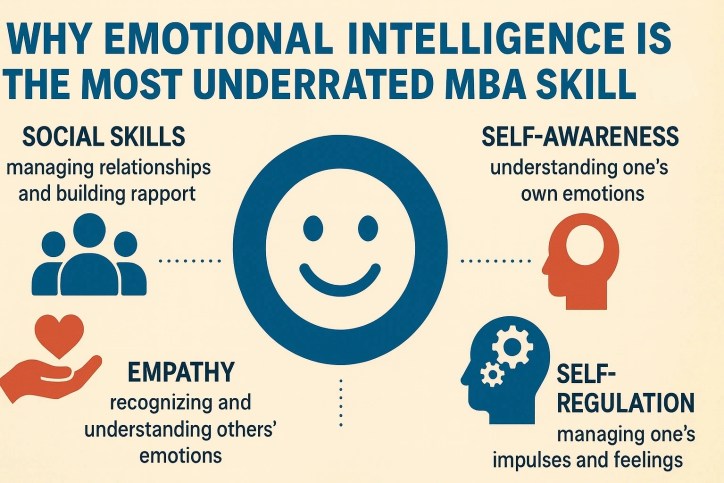
Blog Summary
In today’s competitive world of business and leadership, high IQ and technical expertise were once seen as the most critical strengths for MBA graduates. However, the conversation is shifting. The most influential leaders today often share a skill rarely measured in traditional exams: emotional intelligence in MBA training. This ability to understand, manage, and respond to emotions—both your own and those of others—has become one of the most essential competencies in modern business. Yet, in many MBA programs, it is still undervalued. As workplaces grow increasingly collaborative, multicultural, and digitally connected, emotional intelligence in MBA graduates could be the defining factor that sets future business leaders apart.
- What Is Emotional Intelligence—and Why Does It Matter?
- The Shift in MBA Expectations
- The Value of Emotional Intelligence in Digital and Remote Environments
- Emotional Intelligence for Leadership and Entrepreneurship
- Why Emotional Intelligence Matters in Team-Based Learning
- A Rising Destination: Zambia’s Modern Approach to Business Education
- How to Develop Emotional Intelligence During an MBA
- Looking Ahead: The Future of MBAs and Human-Centric Skills
- Final Thoughts
What Is Emotional Intelligence—and Why Does It Matter?
Emotional intelligence is more than just being “nice” or “sensitive.” It’s a structured framework that includes self-awareness, empathy, motivation, emotional regulation, and social skills. For business professionals, these abilities are crucial for everything from conflict resolution and team dynamics to client relations and leadership under pressure.
When MBA graduates step into roles where they must lead teams, manage crises, or negotiate complex deals, their emotional intelligence will often influence outcomes more than technical skills alone.
The Shift in MBA Expectations
In the past, MBA programs focused heavily on financial acumen, market strategy, and operations. But modern business challenges now demand more. Organizations want leaders who can navigate ambiguity, motivate diverse teams, and handle stress without compromising collaboration. According to a World Economic Forum report, emotional intelligence ranks among the top 10 job skills needed for success in the workplace by 2025—placing it alongside analytical thinking and complex problem-solving.
This is why some of the best online MBA programs today are starting to include emotional intelligence as part of leadership, communication, and human capital courses. Even students pursuing distance learning MBA programs—often while balancing careers and family—are finding emotional skills essential in managing real-life complexity alongside academic goals.
The Value of Emotional Intelligence in Digital and Remote Environments
Business has become increasingly virtual. Meetings, collaborations, and even entire company operations are happening online. In these settings, understanding tone, intention, and mood without physical cues becomes a challenge.
Students who pursue online degree programs must regularly communicate with peers and faculty in virtual environments. For them, emotional intelligence becomes not just useful, but indispensable. The ability to build rapport, listen actively, and communicate clearly across screens directly contributes to academic and professional success.
Emotional Intelligence for Leadership and Entrepreneurship
Leaders today must do more than execute strategy—they must inspire and support. Employees expect authenticity, empathy, and psychological safety. Founders, too, need to motivate teams and build customer trust, especially during uncertainty.
That’s where emotionally intelligent leadership becomes a superpower. It helps in navigating stress, handling rejection, and maintaining team morale. Entrepreneurs who have this edge are better positioned to pitch ideas, attract investors, and retain top talent.
Many business schools, including those in emerging education destinations like Zambia, are recognizing this trend. Institutions here are blending traditional MBA content with leadership coaching and personal development—ensuring that future leaders are not only skilled, but emotionally grounded.
Why Emotional Intelligence Matters in Team-Based Learning
MBA students often work in groups, whether in case study discussions or consulting projects. These interactions mirror real-world workplace dynamics. High emotional intelligence allows students to manage disagreements, provide constructive feedback, and build cohesion—traits that improve not only academic performance but long-term interpersonal skills.
This is especially important for students enrolled in distance learning in Zambia and other countries, where diverse peer groups collaborate across different time zones and cultural backgrounds. Emotional intelligence supports cross-cultural communication, helping students understand perspectives beyond their own.

A Rising Destination: Zambia’s Modern Approach to Business Education
With the increasing accessibility of digital education, countries like Zambia are stepping into the spotlight. Institutions here are offering flexible and globally relevant MBA programs that integrate both hard and soft skills. For students seeking quality education without the cost burden of studying in the West, Zambia provides a compelling alternative.
The growth of affordable MBA programs across universities in Zambia has opened the door for professionals across Africa and beyond to upgrade their qualifications. These programs balance theory with practical experience, and many are now incorporating emotional intelligence workshops, leadership labs, and mentorship components into their design.
Through these innovations, higher education in Zambia is evolving to meet global standards, making its programs more attractive to international students as well.
How to Develop Emotional Intelligence During an MBA
While some aspects of EI may be innate, many can be learned and refined during business school. Here’s how students—especially those in distance learning environments—can actively improve their emotional skills:
- Seek Feedback: Constructive feedback from peers or faculty helps identify blind spots in communication and emotional responses.
- Practice Active Listening: This builds trust and deepens understanding during group work and discussions.
- Reflect Regularly: Journaling or mindfulness practices help increase self-awareness and emotional control.
- Embrace Diverse Interactions: Participating in cross-functional or cross-cultural projects sharpens empathy and adaptability.
- Engage in Leadership Activities: Volunteering for team leads or participating in student forums offers hands-on emotional learning.
By focusing on these practices, students build a solid foundation not just for academic success, but for thriving in their future careers.
Looking Ahead: The Future of MBAs and Human-Centric Skills
We’re entering an era where leadership is less about command-and-control and more about influence, adaptability, and emotional clarity. Employers are increasingly recognizing this and adjusting their hiring strategies to prioritize interpersonal effectiveness alongside traditional skills.
For MBA students, this means the curriculum must evolve. And indeed, it is. Schools are offering emotional intelligence assessments, coaching, and even digital simulations that allow students to practice empathy and self-regulation in real-time scenarios.
Those studying in progressive environments—such as top universities in Zambia that emphasize leadership and development—are gaining not just degrees, but a holistic education designed for modern demands.
Final Thoughts
The business world is being reshaped by innovation, uncertainty, and global collaboration. Amidst this complexity, emotional intelligence stands out as a quiet, powerful force. It enables better communication, ethical leadership, and resilient decision-making—qualities that every future business leader must embody.
Whether you’re pursuing an MBA online, through a hybrid model, or on-campus in places like Zambia, cultivating emotional intelligence will serve you well beyond the classroom. It may not always appear on a transcript, but in boardrooms, negotiations, and team meetings, it often speaks louder than any degree.
As the next generation of leaders emerges, one thing is clear: the future belongs not just to the smartest in the room—but to those who understand themselves and others best.
FAQs
1. Why is emotional intelligence important for MBA students?
Emotional intelligence helps MBA students lead effectively, manage team dynamics, and navigate complex business relationships with empathy, communication, and self-awareness.
2. Can emotional intelligence be developed during an MBA?
Yes, through group projects, leadership roles, feedback, and reflection, MBA students can actively strengthen emotional intelligence skills throughout their program.
3. Do online MBA programs help build emotional intelligence?
Absolutely. Virtual collaboration requires high emotional awareness, making online MBA programs a great platform for practicing empathy, communication, and relationship-building skills.
4. How do Zambian MBA programs incorporate emotional intelligence?
Many Zambian universities integrate leadership training, mentorship, and teamwork activities that promote emotional intelligence alongside traditional business education.
5. Is emotional intelligence valued by employers after an MBA?
Yes, employers highly value emotional intelligence for roles that demand leadership, adaptability, conflict resolution, and team engagement in dynamic business environments.


